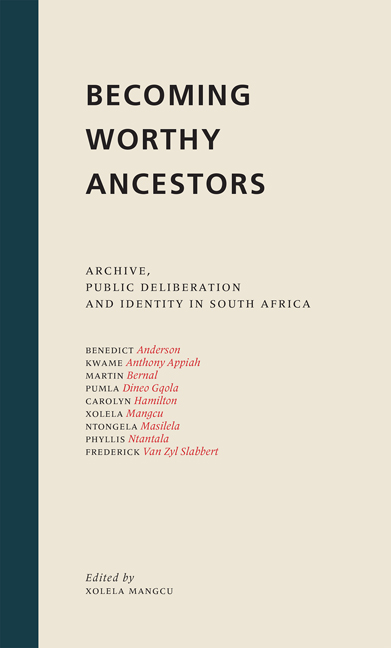Book contents
- Frontmatter
- Contents
- Preface
- Chapter One Evidentiary Genocide: Intersections of Race, Power and the Archive
- Chapter Two The Transmission Lines of the New African Movement
- Chapter Three Some Do Contest the Assertion That I Am An African
- Chapter Four Africa in Europe, Egypt in Greece
- Chapter Five Unconquered and Insubordinate: Embracing Black Feminist Intellectual Activist Legacies
- Chapter Six Identity, Politics and the Archive
- Chapter Seven The Goodness of Nations
- Chapter Eight Why Archive Matters: Archive, Public Deliberation and Citizenship
- Endnotes
- Index
Chapter Eight - Why Archive Matters: Archive, Public Deliberation and Citizenship
Published online by Cambridge University Press: 21 March 2018
- Frontmatter
- Contents
- Preface
- Chapter One Evidentiary Genocide: Intersections of Race, Power and the Archive
- Chapter Two The Transmission Lines of the New African Movement
- Chapter Three Some Do Contest the Assertion That I Am An African
- Chapter Four Africa in Europe, Egypt in Greece
- Chapter Five Unconquered and Insubordinate: Embracing Black Feminist Intellectual Activist Legacies
- Chapter Six Identity, Politics and the Archive
- Chapter Seven The Goodness of Nations
- Chapter Eight Why Archive Matters: Archive, Public Deliberation and Citizenship
- Endnotes
- Index
Summary
INTRODUCTION
The past – often the site of contestation, frequently harnessed to projects of the present as their justification or explanation, and sometimes pursued for pure interest and pleasure – is the object of continual public, political and academic attention. But does archive matter?
Archive obviously matters to anyone who is interested in what proof there is supporting any particular version of the past being promoted, for archive is understood to be the site of the evidence and in the face of such interest it matters whether the evidence is preserved. It follows that archival security matters to those who actively research the past and those in whose care evidence is reposed. Indeed, historical researchers, genealogists and archivists campaign actively for well-managed archives – in South Africa, almost two decades after the transition to democracy, they are ringing alarm bells, raising concerns about inadequate preservatory conditions, poorly-managed institutions, and a worrying lack of skills among archival staff. But does archive matter to everyone else and, if so, in what ways?
In order adequately to pose and answer that question, this essay first unsettles the term ‘archive’ a little, and then considers the unsettled form in relation to three issues, the identified South African national priorities of ensuring reconciliation, development and social cohesion, in which matters of redress and imagined futures are tied up with each other. Through this focus, the essay offers a perspective on the significance, and the current state, of the relationship between public deliberation and archive in South Africa. It explores the legacy of the archives of the colonial and apartheid eras, as well as the legacy of the concept of archive itself that has been inherited from those eras. It situates contemporary acquiescences and challenges to those legacies in the context of South African democracy that assumes the existence of a public sphere in which citizens participate in deliberation, and it considers the matter of what Appiah, in this volume, terms the archive that remains to be written.
- Type
- Chapter
- Information
- Becoming Worthy AncestorsArchive, Public Deliberation and Identity in South Africa, pp. 119 - 144Publisher: Wits University PressPrint publication year: 2011



